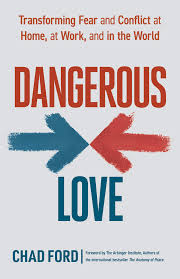
Dangerous Love
I’ve been looking for a go to book that would introduce new readers to peace and conflict studies. Dangerous Love is it.
Ford covers it all—win-win conflict resolution, the costs of demonizing one’s adversary, reconciliation, risk taking, and more. He focuses on the importance of taking the first step and inviting the other party to solve the dispute with you which is invaluable advice as we deal with the COVID-19 epidemic, the recession, and the most recent wave of protests over racial injustice. And, his use of personal examples leaves the reader wanting more.
Rather than discussing the entire book, let me focus on the two key points I made in the previous paragraph.
Dangerous Love was written before any of the crises we are dealing with even loomed on the horizon. Yet, the book points the reader toward things s/he can do. As is the case with almost all of the examples he raises, we are all parties to the disputes raging around us. We aren’t third party neutrals who fly in from Hawai’i (like Ford) or Washington (like me) to solve other people’s problems. We face our own conflict s as what my friends at the Mary Hoch Center for Reconciliation call insider reconcilers. Far from being neutral, we have to intervene, and Ford’s notion of turning first and inviting the other party to help solve the problem together is a critical step forward as we deal with the divisions Americans face today—and those we will face tomorrow.
And as is the case with all great books, Dangerous Love leaves the reader wanting more. Ford does just that by pointing the reader in a number of directions. His footnotes are filled both with references to key texts that anyone who has been engaged in peace and conflict studies with will be familiar with and newcomers should also get to know. Even more importantly, his work is anchored in approaches to peace and conflict studies (e.g., the Arbinger Institute and Peace Players) whose insights and practices will not be familiar to most readers with a background like mine.
In closing, I’ve known about Ford’s work since his days as an NBA draft analyst for ESPN and then when Peace Players introduced me both to his work in conflict resolution and to the Arbinger Institute. We began working together after he sent me a pre-publication copy of Dangerous Love and I saw not only how our ideas overlap but how his outside of the box (at least outside of my box) will help take peace and conflict studies to the next level.
Read this book. You will discover a risk taker of the first order who exudes integrity. And, as befits someone who has spent so many hours in front of television cameras, he is a master story teller unlike the rest of us, especially those of us who have spent the bulk of our professional lives in or near academia.
